2022-2023 Scholars
Meet this year’s exceptional scholars who are driving implementation of effective strategies to raise awareness of diagnosis in medicine, support diagnostic excellence, and reduce diagnostic errors at the national level. If you would like to connect with any of them, please contact us.
Nadja Kadom, M.D.
Emory University School of Medicine/Children’s Healthcare of Atlanta
Dimitri Papanagnou, M.D., M.P.H.
Sidney Kimmel Medical College at Thomas Jefferson University
Michael Pulia, M.D., Ph.D. *
University of Wisconsin-Madison
Naykky Singh Ospina, M.D., M.S.
University of Florida
Sungmin Woo, M.D., Ph.D.
Memorial Sloan Kettering Cancer Center/Weill Cornell Medical College
*Supported by The John A. Hartford Foundation to advance diagnostic excellence and equity for older adults
 Reuben Arasaratnam, M.D., M.P.H.
Reuben Arasaratnam, M.D., M.P.H.
University of Texas Southwestern Medical Center and VA North Texas Health Care System
Dr. Arasaratnam is an assistant professor of internal medicine in the Division of Infectious Diseases at the University of Texas Southwestern (UTSW) Medical Center and a staff physician at the VA North Texas Health Care System where he holds the additional role of Assistant to Medical Services Chief for Education. In this role, he supports the growth of the current educational activities at the Dallas VA Medical Center while providing comprehensive inpatient and outpatient infectious disease care for veterans and serving as Attending on the Internal Medicine Teaching Service. He has also served nationally on the Infectious Disease Item-Writing Task Force for the American Board of Internal Medicine and on guidance panels for vaccination in immunocompromised populations.
Dr. Arasaratnam’s clinical interests include penicillin allergy evaluation, vaccination and infectious disease care of the immunocompromised host. As a medical educator, he has a strong focus on teaching and assessing diagnostic excellence including the impact of team-based care and advancing equity in diagnosis in underserved populations.
Dr. Arasaratnam earned his B.A. from the University of Cambridge, his B.M. B.Ch. with honors from the University of Oxford Medical School, and his M.P.H. from the Harvard T.H. Chan School of Public Health. He completed his residency in internal medicine at the Oxford University Hospital System and the University of North Carolina, Chapel Hill, followed by the Infectious Disease Fellowship at the Baylor College of Medicine, after which he was recruited to UTSW as faculty in 2017. In 2021, he was awarded the Rising Star Award by UTSW – an award recognizing exceptional early clinical career faculty whose actions and activities consistently exemplify commitment, professionalism, and leadership.
Proposal: Advancing the Equity of Penicillin Allergy Diagnosis at a Veterans Affairs Facility
 Miriam Bredella, M.D., M.B.A.
Miriam Bredella, M.D., M.B.A.
Harvard Medical School/Massachusetts General Hospital
Dr. Bredella is a professor of radiology at Harvard Medical School and vice chair for faculty affairs and clinical operations in the Department of Radiology as well as a musculoskeletal radiologist at the Massachusetts General Hospital (MGH). She also serves as Director of the MGH-wide Center for Faculty Development and co-directs the Harvard-wide KL2/Harvard Catalyst Medical Investigator Training Program. She is an active member of the Diversity and Inclusion Task Forces at MGH and Harvard Medical School where she designed successful initiatives for increasing diversity in research operations.
As an NIH-funded physician, Dr. Bredella’s research interests focus on novel functional imaging techniques to determine the effects of different fat depots on bone and metabolic risk across the weight spectrum and in patients with cancer. Through her work, she established a multidisciplinary clinical research program on bone and metabolic imaging that combines innovative translational, clinical, machine learning, and outcomes research. Dr. Bredella has conducted translational research that delivered mechanistic insight into the development of bone loss and skeletal dysregulation in individuals with obesity, anorexia nervosa, and the elderly. Since joining the faculty at MGH, she has been continuously funded as a principal investigator by NIH grants.
Dr. Bredella earned her M.D. from the University of Hamburg, Germany. After a postdoctoral research fellowship at the Osteoporosis and Arthritis Research Group in the Department of Radiology at the University of California, San Francisco (UCSF), she completed a residency in diagnostic radiology at UCSF where she also served as Chief Resident. She then pursued a fellowship in musculoskeletal imaging and intervention at MGH. After completing fellowship training, she joined the faculty of MGH and Harvard Medical School. Dr. Bredella also holds an M.B.A. from the Massachusetts Institute of Technology Sloan School of Management.
Proposal: Using Opportunistic CT and Machine Learning to Diagnose Osteoporosis and Determine Fracture Risk in Underserved Populations
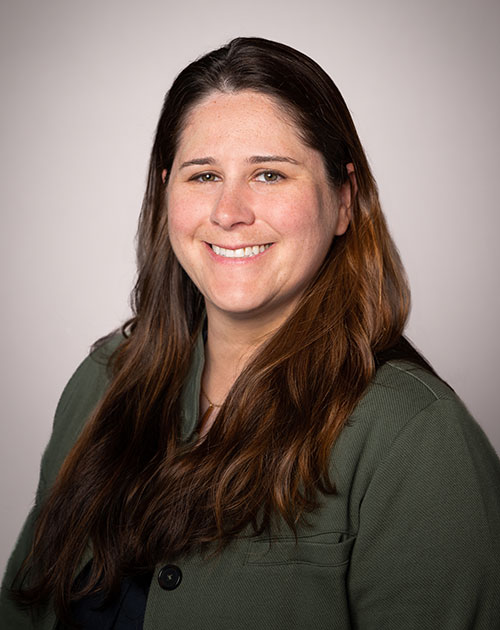 Kimberly Claeys, Pharm.D.
Kimberly Claeys, Pharm.D.
University of Maryland School of Pharmacy
Dr. Claeys is an associate professor in the Department of Pharmacy Practice and Science at the University of Maryland School of Pharmacy, specializing in infectious diseases. She also serves as an Antimicrobial Stewardship Pharmacist at the University of Maryland Medical Center and Co-Chair of the University of Maryland Medical System Sepsis Rapid Diagnostics Working Group.
Dr. Claeys’ clinical research focuses on diagnostic stewardship and excellence in diagnosis; particularly working to improve diagnosis and antibiotic susceptibility reporting to aid in optimizing the treatment of infectious diseases. For instance, Dr. Claeys helps to oversee the implementation of new rapid molecular diagnostic tests for the management of sepsis across the 13-hospital medical system. Through her Ph.D. in Epidemiology, Dr. Claeys has also worked on initiatives to decrease diagnostic error associated with urinary tract infections across multiple Veterans Health Administration sites.
Dr. Claeys obtained her Pharm.D. from Wayne State University, Eugene Applebaum College of Pharmacy and Health Sciences, and subsequently completed her residency at the University of Illinois at Chicago College of Pharmacy. Following her residency, Dr. Claeys returned to Wayne State University to participate in an Infectious Diseases Health Outcomes Fellowship at the Anti-Infective Research Laboratory. Dr. Claeys earned a certificate in public health from Wayne State University, School of Medicine, and is currently a Ph.D. candidate in epidemiology at the University of Maryland School of Medicine.
Proposal: Engaging Antimicrobial Stewardship Pharmacists in Diagnostic Excellence for Urinary Tract Infections
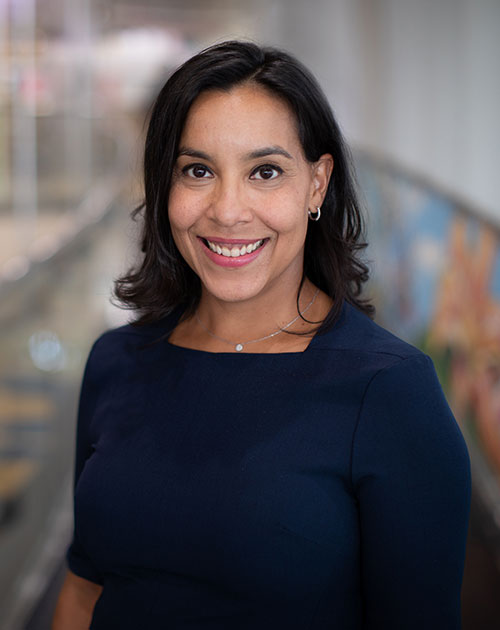 Cristina Gonzalez, M.D., M.Ed.
Cristina Gonzalez, M.D., M.Ed.
Albert Einstein College of Medicine /Montefiore Medical Center
Dr. Gonzalez is a professor of medicine at Albert Einstein College of Medicine and Clinician Investigator of her research grant from the National Institute of Minority Health and Health Disparities. She also serves as an Academic Hospitalist at the Department of Medicine, Weiler Division of Montefiore Medical Center.
Dr. Gonzalez’s research interests are dedicated to designing, implementing, and evaluating skills-based interventions in implicit bias recognition and management (IBRM). Academically, Dr. Gonzalez is an international leader in the development of IBRM curriculum. She is also expanding her horizon by seeking further training in implementation science with a goal of reducing disparities in diagnostic error. By reducing disparities in diagnostic error, Dr. Gonzalez is working to expedite the application of best practices into routine clinical practice and consequently improve patient outcomes with maximum efficiency.
Dr. Gonzalez earned her B.S. at Pennsylvania State University in biology and went on to obtain her M.D. from Albert Einstein College of Medicine. She then completed her internship and residency at New York Presbyterian Hospital and Weill Cornell Medical Center in internal medicine. Dr. Gonzalez also completed a Research Fellowship in Medical Education at the University of Cincinnati. She holds a M.Ed. from the University of Cincinnati in Medical Education.
Proposal: Identifying Specific Behaviors within the Diagnostic Process Influenced by Racial Implicit Bias
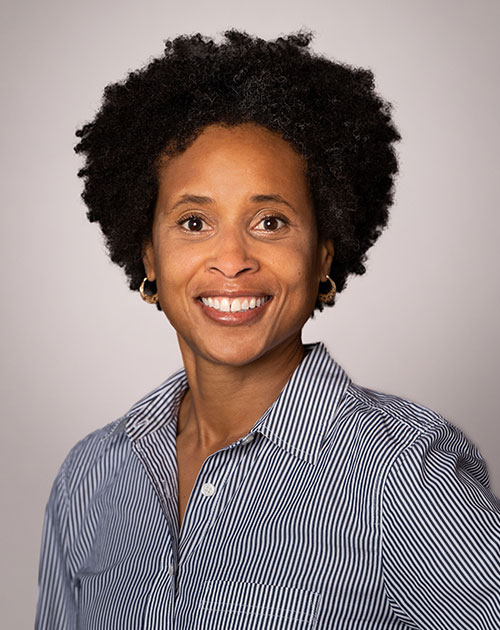 Alaina James, M.D., Ph.D.
Alaina James, M.D., Ph.D.
University of Pittsburgh School of Medicine/University of Pittsburgh Medical Center
Dr. James is a medical dermatologist in the Department of Dermatology at the University of Pittsburgh. She is the founding director of Skin Health Equity which addresses inequities in the field of dermatology including access to care, workforce diversity, equity in visual learning, and clinical research with marginalized communities. Dr. James also serves as a University of Pittsburgh School of Medicine course director of Dermatology and Racism in Medicine: Health Equity Solutions and is a Clinical and Translational Science Institute Affiliate Faculty.
Part of Dr. James’s current research is focused on achieving Visual Learning Equity (VLE) within the health professions. In recently published studies, Dr. James, working alongside a student team, has revealed the disparate representation of visual learning images with brown and black skin in medical textbooks, journal articles and internet searches. These studies showed that health education is normalized to white skin which negates the different clinical presentation of skin conditions in patients with brown and black skin color. Dr. James’s research demonstrated how the lack of representation of black and brown skin has led to lower diagnostic acumen and negative health outcomes for people with brown and black skin. Through the VLE program, Dr. James has developed a health education campaign with action steps to achieve equitable representation of the skin color spectrum. The goal of VLE is to achieve diagnostic excellence in visual diagnosis of skin conditions.
Dr. James earned a B.S. in molecular biochemistry from Yale University. Afterwards, she completed M.D. training combined with a Ph.D. in cell biology at Baylor College of Medicine. Shortly following her time at Baylor, Dr. James went on to complete an internship at Morristown Memorial Hospital. Subsequently, she completed her dermatology residency at the University of Pennsylvania. As a lifelong learner, Dr. James recently completed a Career Education and Enhancement for Health Care Research Diversity Program at the University of Pittsburgh and the Physician Leadership Program in UPMC Physician Education.
Proposal: Do you see me? Visual Learning Equity: Achieving Diagnostic Excellence in Skin Health and Disease
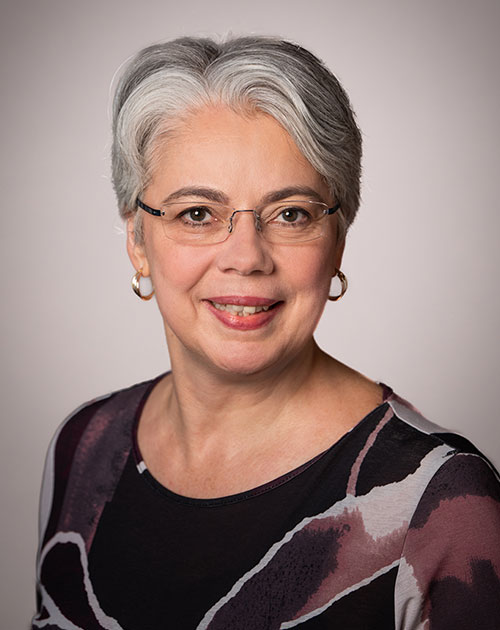 Nadja Kadom, M.D.
Nadja Kadom, M.D.
Emory University School of Medicine/Children’s Healthcare of Atlanta
Dr. Kadom is a professor of radiology and imaging sciences, and an adult and pediatric neuroradiologist with the Emory University School of Medicine. Additionally, she serves as the Interim Medical Director of Quality for the Department of Radiology and Imaging Sciences. At Children’s Healthcare of Atlanta, Dr. Kadom is the Director of Quality for Pediatric Radiology. Nationally, Dr. Kadom chairs the American College of Radiology Metrics Committee and serves on the Executive Council of the American Roentgen Ray Society.
Dr. Kadom’s research focuses on patient-centered imaging. Dr. Kadom completed grant-funded research to develop a simple and easy to understand message to patients that can be inserted into radiology reports when there is an actionable finding. Dr. Kadom leads a major initiative attempting to foster appropriate use of imaging for children with headache. The research team developed decision algorithms guiding the use of imaging in children with headaches and that are available via the R-SCAN initiative by the American College of Radiology. Currently, Dr. Kadom is involved in a grant-funded project evaluating the cost-effectiveness of an abbreviated imaging protocol for the brain in children with headaches. Dr. Kadom is partnering with the American College of Radiology Patient- and Family-Centered Care Committee to review and develop patient decision aids for children with headaches and other imaging scenarios.
Dr. Kadom earned her M.D. from the Rheinisch-Westfälische Hochschule Aachen. Dr. Kadom completed her residency in diagnostic radiology at the Protestant St. John Hospital in Bielefeld, Germany. Dr. Kadom completed fellowships in neuroradiology at George Washington University and pediatric neuroradiology at the Children’s National Medical Center in Washington, DC. Dr. Kadom completed the mini Advanced Training Program (mini-ATP) for quality improvement from Intermountain Healthcare. Dr. Kadom completed the New York University Value of Imaging through Comparative Effectiveness (VOICE) program.
Proposal: Developing a Patient Decision Aid (PDA) For Use in Children with Headaches
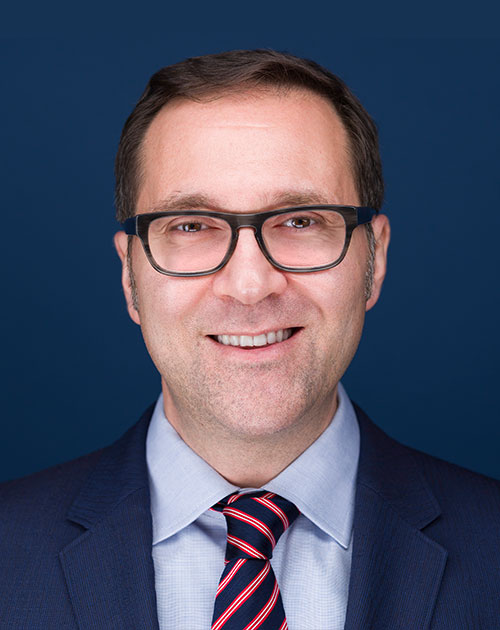 Dimitri Papanagnou, M.D., M.P.H.
Dimitri Papanagnou, M.D., M.P.H.
Sidney Kimmel Medical College at Thomas Jefferson University
Dr. Papanagnou is a professor of emergency medicine and Vice Chair of Education in the Department of Emergency Medicine at Thomas Jefferson University, Sidney Kimmel Medical College. Dr. Papanagnou also serves as the Associate Dean of Faculty Development and the Associate Provost of Faculty Development with a specific emphasis on Health Professions Education and Scholarship. In addition, he is also directs the Health Systems Science curriculum in the medical school.
Dr. Papanagnou’s research has been dedicated to the development of targeted training interventions that improve the diagnostic process and enhance team performance in complex clinical environments. This has been reflected in his early work with multidisciplinary, team-based learning initiatives across hospitals within New York City’s Health and Hospitals Corporation. His current work addresses gaps in undergraduate and graduate medical education surrounding diagnostic uncertainty as a means to mitigate diagnostic error.
Dr. Papanagnou earned his B.S. in biomedicine from the accelerated Sophie Davis School of Biomedical Education BS/MD Program of the City University of New York. He then went on to obtain his M.P.H. in Health Policy and Management from the Mailman School of Public Health at Columbia University. Dr. Papanagnou received his M.D. from the New York University (NYU) School of Medicine. Subsequently, he completed his residency in emergency medicine at Bellevue Hospital/NYU Langone Medical Center.
Proposal: “Unfortunately, I Do Not Have a Diagnosis for You”: Interprofessional Training for the Equitable Communication of Diagnostic Uncertainty in the Emergency Department
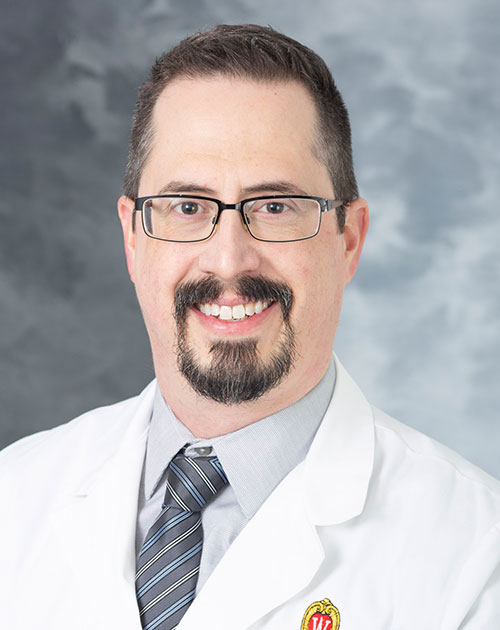 Michael Pulia, M.D., Ph.D. *
Michael Pulia, M.D., Ph.D. *
University of Wisconsin-Madison
Dr. Pulia is a physician-scientist and tenure-track assistant professor in the Department of Emergency Medicine at the University of Wisconsin-Madison. He also serves as the Director of the Emergency Care for Infectious Diseases Research Program, and Emergency Medicine Antimicrobial Stewardship.
Dr. Pulia’s research focuses on improving the quality and safety of infectious disease care in the emergency department. This is achieved by applying systems engineering and human factors methods to reduce diagnostic errors and inappropriate use of antibiotics in healthcare settings. Furthermore, Dr. Pulia is particularly interested in the older adult population as they are at significantly increased risk of harm related to infection misdiagnosis and unnecessary antibiotics.
Dr. Pulia earned his B.S. in chemistry and political science at Illinois Wesleyan University and his M.D. at Loyola University Stritch School of Medicine. Dr. Pulia completed his residency in emergency medicine at the University of Illinois-Chicago. He earned his Ph.D. in clinical investigations at the University of Wisconsin-Madison.
Proposal: Improving Diagnostic Accuracy for Older Adults with Suspected Pneumonia
*Supported by The John A. Hartford Foundation to advance diagnostic excellence and equity for older adults
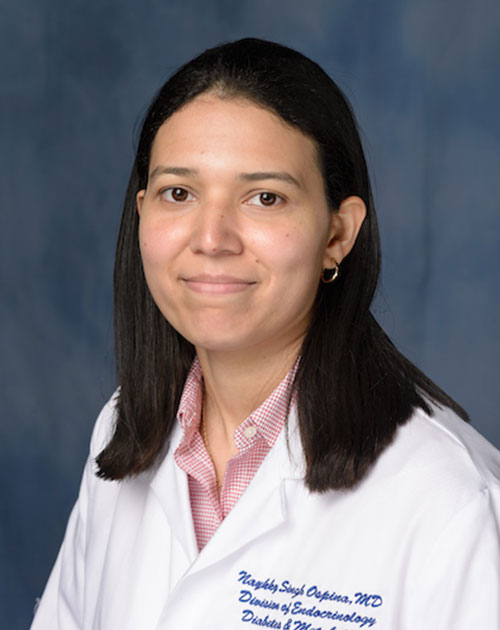 Naykky Singh Ospina, M.D., M.S.
Naykky Singh Ospina, M.D., M.S.
University of Florida
Dr. Singh Ospina is an associate professor in the Division of Endocrinology within the Department of Medicine at the University of Florida. Dr. Singh Ospina also serves as the chair of the thyroid cancer tumor board and was the Endocrine Division educator director. She is also a Guideline Methodologist with the Endocrine Society.
Dr. Singh Ospina’s research interests are directed towards improving the care of patients with endocrine conditions. In particular, she is working to improve the quality of care patients with thyroid nodules and thyroid cancer receive, incorporating evidence based medicine with enhanced patient-clinician communication, and shared decision making. Dr. Singh Ospina is focused on advancing the field of diagnostic excellence, focusing on the improving the quality of diagnostic conversations and decreasing the frequency and harms of overdiagnosis and diagnostic errors.
Dr. Singh Ospina earned her M.D. at the University of Panama and completed her residency at John H. Stroger, Jr. Hospital in internal medicine and her endocrinology fellowship at the Mayo Clinic. She also holds an M.S. from the Mayo Clinic Graduate School in Clinical and Translational Research and a Certificate in Implementation and Dissemination Science from the University of Florida. Dr. Singh Ospina is certified in internal medicine and endocrinology by the American Board of Internal Medicine.
Proposal: Developing a Framework for Understanding the Process of Diagnostic Reconciliation and Supporting Diagnostic Conversations
 Fatima Cody Stanford, M.D., M.P.H., M.P.A., M.B.A.
Fatima Cody Stanford, M.D., M.P.H., M.P.A., M.B.A.
Harvard Medical School/Massachusetts General Hospital
Dr. Stanford is an associate professor of medicine and pediatrics and an obesity medicine physician scientist at Massachusetts General Hospital (MGH) and Harvard Medical School. She also serves as the director of equity at MGH and the director of diversity at the Nutrition Obesity Research Center at Harvard. She is a nationally and internationally sought-after expert in obesity medicine who bridges the intersection of medicine, public health, policy, and disparities.
Dr. Stanford’s current work focuses on the application of pharmacotherapy for patients who have undergone weight loss surgery and the policy that entails obesity coverage in the U.S. and abroad. Her work also involves shared decision-making in obesity therapy, weight bias and stigma, and treating children, adolescents, and adults with obesity.
Dr. Stanford received her B.S. and M.P.H. from Emory University as an MLK Scholar, her M.D. from the Medical College of Georgia School of Medicine as a Stoney Scholar, and her M.P.A. from the Harvard Kennedy School of Government as a Zuckerman Fellow in the Harvard Center for Public Leadership. She also received her M.B.A. at the Quantic School of Business and Technology as a merit-based scholar. She completed her obesity medicine & nutrition fellowship at MGH/ Harvard Medical School after completing her internal medicine and pediatrics residency at the University of South Carolina. Dr. Stanford is board certified in obesity medicine and pediatrics.
Proposal: Beyond Body Mass Index (BMI): Improving Diagnosis of Obesity to Better Inform Treatment Strategies
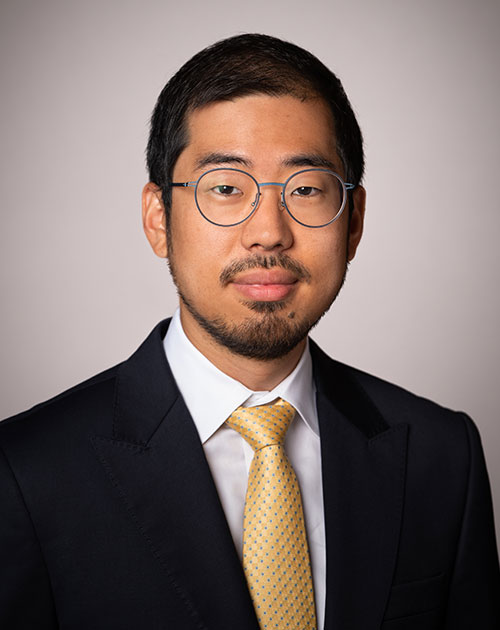 Sungmin Woo, M.D., Ph.D.
Sungmin Woo, M.D., Ph.D.
Memorial Sloan Kettering Cancer Center/Weill Cornell Medical College
Dr. Woo is the director of genitourinary radiology at the Memorial Sloan Kettering Cancer Center and an assistant professor of radiology at Weill Cornell Medical College in New York. He also serves as an assistant attending radiologist at the Memorial Sloan Kettering Cancer Center. He is on the Expert Panel on Urological Imaging at the American College of Radiology and is a member of the Korean Society of Radiology.
Dr. Woo’s research primarily focuses on imaging of prostate, bladder, and kidney cancers, as well as gynecologic cancers to assess how these cancers spread to other parts of the body, evaluating treatment response, and predicting prognosis. He is especially interested in how advanced imaging such as cutting-edge MRI techniques and novel PET techniques can be used as biomarkers to improve the diagnosis and treatment for these cancers. He has led a multi-center/multi-disciplinary study showing that MRI followed by targeted biopsy increases detection of “clinically-significant” prostate cancers, influencing major urology guidelines. Dr. Woo is also exploring how the integration of imaging and liquid biomarkers can improve diagnosis and treatment response in cancer patients.
Dr. Woo earned his M.S., M.D., and Ph.D. from the Seoul National University College of Medicine. He completed his residency in radiology at the Seoul National University Hospital and a fellowship in oncologic imaging at the Memorial Sloan Kettering Cancer Center.
Proposal: Reducing Diagnostic Errors by Improving Communication through Structured Reporting of Ovarian Cancer Imaging Examinations